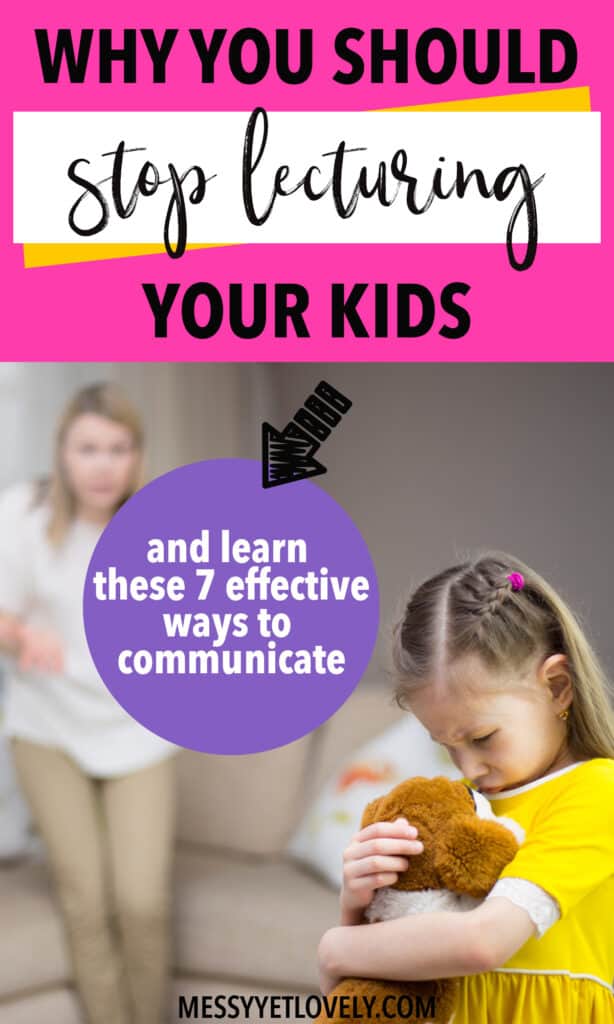Less is more.
This can be applied in many areas of life. But this is especially true in the way we interact with kids.
I mean, it doesn’t mean you interact less with kids. But if you find yourself you are a lecturing parent who has no set limit on the number of words you use while disciplining kids- pause and think.
Does lecturing really work?
How do our kids react when we lecture?
Chances are they start tuning you out, roll their eyes, and may even repeat the undesired behavior again another day or even worse- they don’t stop doing what they were doing despite the lecture.

WHY DO PARENTS LECTURE?
Most of the time, parents start lecturing when children make the same mistakes again and again and children do not seem to get “why it is wrong”.
And out of frustration, we may believe talking non-stop will help them to “realize their mistake and learn a lesson”.
Parents might also believe that “kids should get a good beating” to really get the message instilled in them.
And we resort to lecturing to get all that anger and disappointment out in the hope they will not repeat the same mistakes again. It is also a way for parents to release their emotions.
Another reason for parents’ lecture is fear – fear of children making bad choices or not learning good behaviors and become responsible people who can take care of themselves.
They fear if they don’t keep pointing out and keep on correcting, kids will fail.
WHY LECTURING KIDS DOESN’T WORK?
- Studies show that lectures are not only boring but ineffective too. Children learn more by stimulating, active-learning methods
- They don’t learn to be responsible if all you do is always nagging and pointing out their mistakes
- They learn to tune you out and they don’t hear anything you are trying to teach them
- Lectures don’t give any new information. All you do is repeat the same story over and over sounding like a broken record
- Lecturing involves labeling and painting a negative image of the person. “You are always doing this”, “You never pick up your clothes, why are you being so messy?”, etc. This is not helpful information and this further makes them feel bad about themselves and promote negative behavior even more as they may start to believe “I can’t do anything right” and that they are failures
- When we lecture instead of implementing consequences, we prevent kids from learning from their mistakes

So how to be aware if you are lecturing?
Observe how you talk with kids. If you are doing the following a lot, you could be having the lecturing habit.
- You do a lot of reminding
- You keep on talking without listening to what the child has to say
- You keep on nagging them to do their tasks
- You use threats
If you resort to the above methods to make kids do their tasks, you must have already experienced that they don’t work. Especially, when kids grow up, you will experience more power struggles and emotional outbursts.
So, what to do about this?
Let’s see what parents can do instead of lecturing to help kids listen better.
HOW TO STOP LECTURING KIDS?
1. GAIN CONTROL OVER YOUR EMOTIONS
Parents tend to start a lecture when they are angry over a situation. At the moment when you feel tempted to start a lecture, remember how you want to break free from the habit.
And even if you started lecturing out of muscle memory, stop immediately.
I know it’s easier said than done. But you can better at it with practice if you implement the following actionable tips.
Related: 7 common anger triggers for moms (and how to deal with them)
2. HELP KIDS MAKE A ROUTINE
Instead of nagging and reminding, help kids think for themselves. If there are chores that children must be doing every day, help them make a daily planner for themselves.
You can print out a daily planner page online and help them organize their chores and fit them within the morning or evening routines.
For younger kids, you can draw pictures or print out photos of themselves doing the tasks and stick somewhere they can see.
It was a hassle for me to make my daughter get ready for school as I had to keep reminding her to wear her ID, take her bag, and put on her shoes every day.
I made a checklist for her and stuck it where she could see it while getting ready. After that, things started to function smoothly. All I had to ask was. “Did you do everything on your checklist?”.

3. USE WHEN-THEN
One of my favorite tools I learned from Amy McReady is the when-then tool.
It goes like this.
When you have finished your homework, then you can come down for dinner
When you have made the bed, then you can have your favorite pancakes for breakfast
When you have put your folded clothes away, then we can play badminton for some time
After clearly expressing what they are expected to do, you can walk away from the room so as to avoid any power struggle.
Use your calm, but stern voice when you say this. When-then routine is usually used when the privilege (the then part) is something kids are happy about.
Avoid repeating and reminding and implement the consequence without creating a fuss. Even if kids don’t co-operate the first few times if you implement consequences they know that you are a person who stands by her word.
4. KEEP IT BRIEF
In the book, “How to Talk So Kids Will Listen & Listen So Kids Will Talk”, the authors (Adele Faber & Elaine Mazlish) talk about the effectiveness of using short words to communicate better.
Often, a single word or two-three words will do.
(If you haven’t read this book, it is highly recommended. I learned a ton of useful tips from this book.)
Example:
If the dirty laundry is all over the floor, just say “the dirty clothes”.
I like this method as it saves us a lot of energy that takes to start another “how many times have I told you?”.
It is easier for kids too. They are saved from another boring lecture.

5. BE MINDFUL OF NEVER AND ALWAYS
The way we talk has a lot of impact on children’s behavior. The problem with lecturing is that we are frustrated about the repeating behavior.
If you use words like “never” and “always”, you can expect them to repeat the behaviors again.
For example,
You never do your homework on time
You are always late
This is not a helpful talk. There might be at least one time when they did homework on time or when they were on time for school.
This discourages the child further and he can form limiting beliefs like “I am a loser” or “I can never do anything right”.
This further increases the misbehavior as the child doesn’t feel motivated to correct his mistakes which can further keep you repeat the lecturing habit.
When you learn the effective ways to talk you find that there is no need to lecture.
Related: 20 worst things parents say to kids
6. HOLD FAMILY MEETINGS AND ASK EFFECTIVE QUESTIONS
Sometimes we keep droning on without knowing what was in the kid’s mind while acting irresponsibly.
Instead of blaming him and lecturing for “forgetting” to do his responsibilities again, ask why, and “how can I help?”
When you ask questions, we get to know why they act the way they do.
If it is just laziness, you can explain how taking part in the family responsibilities help the family to function smoothly and keeps everyone happy.
If it’s forgetfulness, ask them how you can help to remember the tasks without a constant reminder from you.
The best way to discuss the problematic behaviors and avoid a parental lecture is to conduct family meetings.
During the family meeting, you can state what you expect them to do. And listen to what they have to say. If needed, you can write them down too.
And after listening, come up with ideas to solve the issue respectfully.
You can ask kids for their ideas and finalize the best ideas.
What this does is that children realize that parents are on their side and that they can solve family problems in a respectful way without the need for punishments or lectures.

7. KNOW WHERE TO DRAW THE LINE
I am a recovering control freak who would experience lots of anxiety when things don’t go as I planned.
Of course, it is for everyone’s benefit. But when I found out it was discouraging everyone around me more than being happy about the “outcome” I was looking for.
No one likes to be controlled or like it when they feel powerless. And it’s a myth to think that you can control other people, even if it’s toddlers.
When I found out that “wanting to be in control” led me to do a lot of reminding, nagging, and lecturing, I decided to break free from my controlling habit.
Now whenever I find the need to nag, I ask myself “Does it really matter that he/she does ………?”
“Will it affect them negatively in five years?”
If no is the answer, I know I can pass.
If it’s something you are sure that they are making a mistake despite your warnings, let them experience the consequences (natural or logical consequences).
Mistakes teach them better than their parents can. It’s so much better than nitpicking and worrying constantly about the child’s behavior.
Related:
- 11 effective tips to get kids to listen without yelling or nagging
- 10 warning signs that you may be a helicopter parent (and how it affects kids)
- How to stop being a helicopter parent (10 effective tips to raise happier kids)
8. PREVENT LECTURING BY ENCOURAGING
Why do parents lecture?
Because you feel disappointed by kids’ behavior.
How can you put an end to these disappointing behaviors?
By encouraging good behaviors.
I have heard children complaining, “Mom (or dad) always sees my negatives. They don’t see it when I do things right”.
The truth is it’s unreasonable to expect continuous good behavior from kids if all you do is discouraging.
Make sure you appreciate good behavior and always “see” it. Try to keep more positive words than negative ones. This will motivate them to behave better and you have less need of lecturing when you also put all the above tips into practice.
MORE PARENTING POSTS:
- How to teach your child to be independent
- How to get kids started on doing chores
- 17 basic life skills all kids must learn before leaving home
- 12 healthy habits all kids must learn
- How to stop yelling at kids when angry
- 16 signs you’re raising a spoiled teenager & how to fix it
Like this post? Please take a moment to PIN and SHARE!

